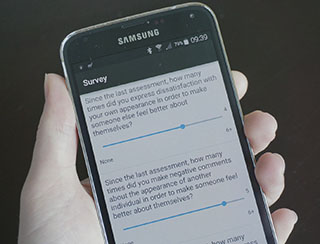'My thighs are so fat!' Tracking fat talk through your smartphone
Media release Seemingly harmless comments like ‘My thighs are huge’ or ‘I hate my calves’ are feeding the body image problems of many women.
Seemingly harmless comments like ‘My thighs are huge’ or ‘I hate my calves’ are feeding the body image problems of many women.
Deakin University psychology researchers want to track women’s experiences of fat talk to get a thorough insight into how often and in what situations these conversations occur.
“Women’s body image is a widespread issue within our society and is associated with a range of negative health consequences, ranging from body dissatisfaction to disordered eating,” Deakin associate lecturer in psychology Jacqueline Mills explained.
“Fat talk, or speaking about our bodies in a negative way, is not as harmless as it may appear.
“Although you might think talking about the parts of your body that are getting you down would help you to feel better, fat talk has been shown to actually increase body dissatisfaction levels. Engaging in fat talk has also been linked with greater acceptance of the “thin ideal” promoted by the media, as well as comparing your appearance with how other people look.”
Ms Mills said that what is perhaps more concerning is that there seems to be a contagious element to fat talk.
“Hearing someone speak negatively about their body, or even that of another person, can greatly increase the chances of you engaging in fat talk yourself,” she said.
“Ultimately, fat talk can help reinforce the idea that women should be largely valued by the way they look, leading to women obsessing over their appearance, which just starts the whole cycle again.”
Ms Mills is calling on women aged 18 to 40 years to take part in the study.
“The study involves taking an online survey in addition to a smartphone app (iPhone or Android) that delivers repeated mini-surveys throughout the day for a week,” she said.
“The app will measure moment to moment fluctuations in women’s body image experience across multiple days. This will give us a comprehensive view of women’s experiences with fat talk in their regular social interactions.
“Understanding context in which fat talk occurs will be useful in developing effective preventative measures, as well as intervention models, to deal with body dissatisfaction.”
Anyone wanting to take part in the study can contact Ms Mills via email at either fat.talk.research@gmail.com or jacqueline.mills@deakin.edu.au or via phone on 9251 7637.
